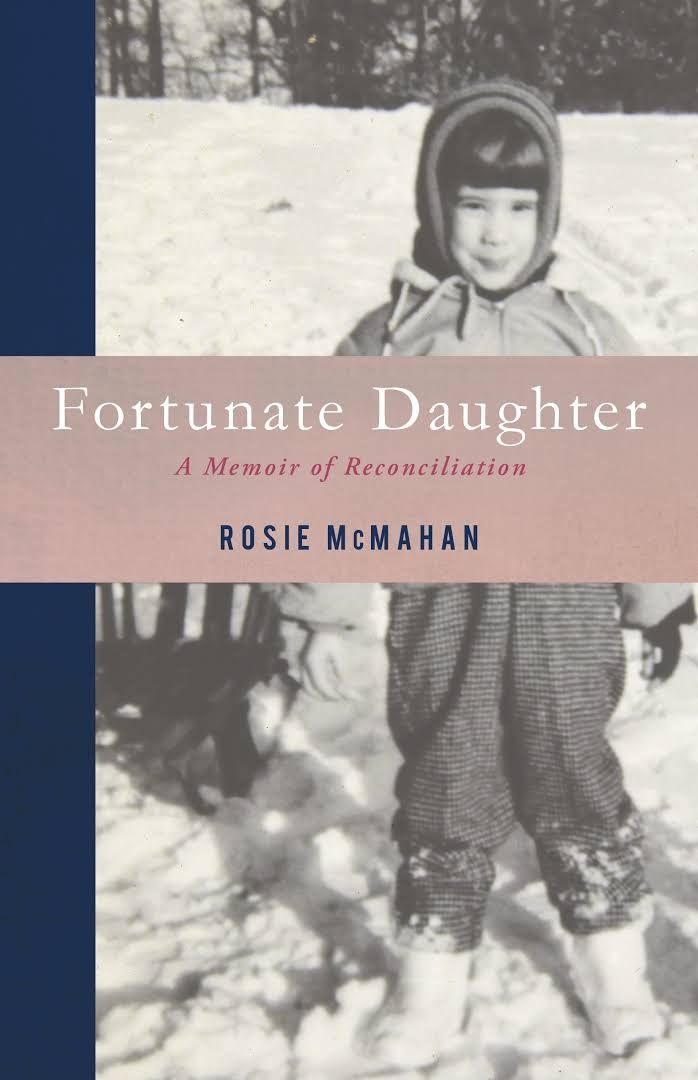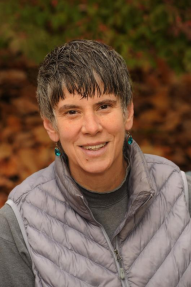Themes of reconciling, resiliency shine in Rosie McMahan’s immersive book
 BOSTON, MA – Rosie McMahan recounts her difficult childhood that left her with feelings of shame, guilt, and a need to reconcile for years to come in “Fortunate Daughter” (April 13, 2021, She Writes Press). Rosie takes us through her experience as she and her family attempt to move on from sexual abuse, and the emotional, spiritual and even cultural complexities that come along with forgiving her father, but never being able to forget the past.
BOSTON, MA – Rosie McMahan recounts her difficult childhood that left her with feelings of shame, guilt, and a need to reconcile for years to come in “Fortunate Daughter” (April 13, 2021, She Writes Press). Rosie takes us through her experience as she and her family attempt to move on from sexual abuse, and the emotional, spiritual and even cultural complexities that come along with forgiving her father, but never being able to forget the past.
Her family’s open discussions after sexual abuse may not be conventional, but it helped all of their healing processes.
Rosie’s story is shattering beliefs about victims and abusers alike, showing that there is a path to reconciliation if the abuse is acknowledged and the abusers take responsibility. Rosie’s past experience has not changed with her decision to accept it and move on, but her approach has allowed her to continue with her life despite past trauma.
Her training as a counselor and educator is bolstered by what she experienced in her own healing process. Not as someone who experienced betrayal, abuse, and abandonment. Those things happened to her and they are important to acknowledge. What informs her today, and gives her courage, is her experience of healing. Fortunate Daughter is a way to show others that while not always possible, reconciliation can be achieved and be a fulfilling step on the road to true healing. An inspiring story of bravery and honesty in the face of trauma.
“Fortunate Daughters: A Memoir of Reconciliation”
Rosie McMahan | April 13, 2021| She Writes Press | Memoir
Paperback | 978-1-64742-024-6 | $16.95
 ROSIE MCMAHAN: Rosie McMahan was brought up in Somerville, MA at a time when kids and dogs roamed the streets in unlawful packs, and the walk to a barroom or a Catholic church was less than a quarter of a mile away in any direction. Her and her husband moved to western MA in 2001 to raise their children, now 23 and 18 years old.
ROSIE MCMAHAN: Rosie McMahan was brought up in Somerville, MA at a time when kids and dogs roamed the streets in unlawful packs, and the walk to a barroom or a Catholic church was less than a quarter of a mile away in any direction. Her and her husband moved to western MA in 2001 to raise their children, now 23 and 18 years old.
Her writing has received prizes and she can be heard reading in local venues, including Pecha Kucha (a local storytelling event), the annual Garlic & Arts Festival and the Greenfield Annual Word Festival (GAWF). In October 2017, she was one of the featured writers in “The Gallery of Readers” series held at Smith College each year. And in 2018, her writing was presented in a juried exhibition titled
“COLLABORATION” held at the Burnett Gallery in Amherst, MA. She has also been published in several journals, including Silkworm, Typehouse Literary Magazine, Black Fox Literary Magazine, the 2017 Gallery of Readers Anthology, and Passager Journal. Recently, she wrote a piece titled “After All These Years” that was published on https://www.timetotell.org/curated-stories.
In an interview, Rosie McMahan can discuss:
- What conditions need to exist for someone to be able to reconcile with their perpetrator – working with skilled therapists who understand and value healing
- Her work as a counselor utilizing restorative justice principles and trauma informed care values
- What led her to become a survivor activist who embraces resiliency, honesty and compassion in the work she does
- Active rejection of the stigma that comes from being someone identified as a person with a trauma history who does not distinguish herself as a victim
- The experience of going through a constructed reconciliation process that allowed for a healing journey that didn’t just benefit Rosie, but her whole family
An Interview with Rosie McMahan
1. What do you want readers to learn from your life experience?
So many things. What it is like to experience childhood sexual abuse in the context of one’s family. The difficult journey of healing.The multifaceted process of going through reconciliation with one’s parents, the main perpetrators of abuse. The need for people in helping positions to deepen their understanding of what it means to enter a child’s life with the intention to prevent abuse and promote healing. Healing practices must recognize the possibility of healing – even when it’s not clear that it’s an option.
2. Many abused children survive and thrive, but few live without the trauma of their past within them. How has your experience and acceptance of what happened helped you with that?
‘The past is never the past’ – fully – for anyone. If you want to know me, really know me, you have to understand that I was injured as a child, but you also have to know about my healing experience. As a culture, we are more comfortable focusing on the harm than we are on the healing, for both the victims and the perpetrators. That needs to change. My healing journey allowed for me to move forward in my life for a few reasons, one of them being that my parents, the perpetrators, were invited to participate in a confrontation process that ultimately provided us to reconcile with one another. If this was a more available option, more people would be able to participate and more people would be able to heal in this way.
3. What advice would you give to people searching for a way to “put things right”, and forgive?
This, too, is a complicated process. You have to be able to access good (trauma informed) care. You have to be willing to do the work of healing. You have to acknowledge what happened and not downplay or dismiss your feelings about it. You have to be brave. You have to reject some of the early lessons you learned that did not promote mental health and well being. You have to decide what you need independent of what others may offer you. You have to risk the potential loss of family members from your life.
4. How has your life changed since you accepted your past as part of who you are?
My life is influenced by many things. When I was a child and well into my teens, I didn’t have many examples of people who’d gone through what I endured and had been able to succeed. I thought – even if I healed – I was doomed to a life that would be more tragic and unfulfilling. It took me a long time to embrace the notion that I wasn’t just ‘damaged goods’. That is why I wrote this story. That is why I want to share it. Many people are injured and a lot of them heal. I don’t know anyone else who was permitted the experience of reconciliation that I was. That is what has made a huge difference.
5. What do you think needs to change regarding the way people and the media in general acknowledge sexual abuse? Do you think there needs to be a system in place that helps families talk through their trauma?
First, we need to acknowledge that sexual abuse and the epidemic of sexual abuse is real. Then we need to help families in such a way that affords them the option my family had. Systems – child protective services – have been realizing for some time that the decision to remove children from their parents when there is real concern of harm – while it might be essential at times – is not necessarily a long term solution for many families.

A former award-winning journalist with national exposure, Marissa now oversees the day-to-day operation of the Books Forward author branding and book marketing firm, along with our indie publishing support sister company Books Fluent.
Born and bred in Louisiana, currently living in New Orleans, she has lived and developed a strong base for our company and authors in Chicago and Nashville. Her journalism work has appeared in USA Today, National Geographic and other major publications. She is now interviewed by media on best practices for book marketing.
